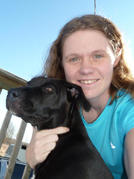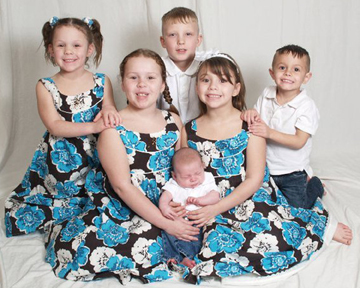The Harvard Family Research Project separated from the Harvard Graduate School of Education to become the Global Family Research Project as of January 1, 2017. It is no longer affiliated with Harvard University.

|
September 20, 2012 We Were a "Hard-to-Reach" FamilyNikia Parker
|
FINE Newsletter, Volume IV, Issue 3
Issue Topic: Facilitating Continuous Family Engagement
Voices from the Field
Nikia Parker reflects on her family’s experience with the Head Start program and her journey from being a “hard-to-reach” parent to an actively engaged parent who has served as an advocate and leader within the Head Start community for the past 10 years. Parker, a nurse, lives in Michigan with her partner, Don Oster, and their 6 children, 5 of whom have benefited from Head Start services.
When our family was first referred to Early Head Start (EHS) for services for our 7-month-old daughter, Madyson, we were wary about signing up. Our prior experiences with service agencies—most of which we had leaned on for assistance related to issues of poverty—had been discouraging and even humiliating, and had resulted in a buildup of mistrust that made it hard for us to reach out for and accept help. But the persistence and kindness of a home visitor from EHS changed all of that, and our lives, forever.
GETTING PAST FEAR AND FRUSTRATION
Our family’s journey with EHS (and later Head Start) began when a previous parenting program we had been involved with, Parents as Teachers, ended, and our home visitor through that program referred us to Early Head Start. We were reluctant to sign up for services because we had been let down by several other social service agencies, and we didn’t want to have to deal with the same frustrations all over again. But the relationship we gradually developed with Shirl, our EHS home visitor, helped us break through these and other barriers and make significant changes in our lives.
Our past bad experiences with service agencies ran the gamut from our being overwhelmed by the tremendous amount of paperwork and bureaucracy that was involved in dealing with these agencies to our having more deep-seated fears and anxieties about what that agency’s involvement would mean for our family unit. Some of the children in my extended family had been lost to the foster care system, which is such a frightening experience. It is like a death, except that you don’t know if cousin Bobby is happy in Heaven or if he’s sad or being hurt. You’re always worried. The bureaucracy of protective services all too often ends up hurting families even though it may be protecting children from harm. Because these agencies represent services that are supposed to help but sometimes hurt, mistrust toward one often gets transferred to all agencies that are supposed to help.
Another reason that we hesitated to get involved with Head Start was the fact that some of the agencies we’d been involved with in the past had not been very compassionate or flexible in addressing the needs of families, like ours, who were experiencing crisis because of poverty. It isn’t fair, but poverty feels shameful, even though the circumstances that put many people in that situation are almost always beyond their control. Some organizations feed that shame, so people who really need to access services have to weigh the benefit of receiving the services against the emotional toll exacted by the shame they’re made to feel when they do. Agencies need to understand that the less shame they put on families, the greater likelihood families will take advantage of the benefits offered.
By the time we were referred to EHS, we were discouraged and far from eager to take our chances with such services again. In some ways, our concerns all related to the fact that we had developed significant trust issues that made us skeptical and difficult to reach. In the past, when we had extended a hand for help, we had either been ignored or treated disrespectfully, and the efforts we made to work our way out of poverty often were “rewarded” with additional barriers, or worse, some kind of punishment.
LEARNING TO TRUST
 |
|
Nikia's and Don's children. |
When we met Shirl, the home visitor from EHS, we were still reeling from our previous experiences and weren’t inclined to work with her. We were reserved at first and didn’t trust the program or the people operating it. It took Shirl nearly a year of consistent attempts to earn our trust in order to really get us on board and engaged with the program.
At first we wondered if she was just being persistent because it was her job to stay in touch with us. After a while, we thought maybe she just didn’t have enough to do, and at times we wondered which one thing we might end up doing that would irritate her and send her packing. It was like we were waiting for the other shoe to drop and for her to abandon us, like so many others had. We weren’t easy to deal with, I realize. Engagement was a process; it happened slowly and tentatively, but once it took hold, it was like going for broke.
The change in our relationship with Shirl began with our trusting her to show up for visits. We eventually started to make the same commitment, making sure we were always there for our scheduled meetings. Then we gradually began to trust her advice and started going to family fun events where we met other families. Even then, however, there were times when I trusted Shirl but not the rest of the program. That changed after Shirl’s intervention with my 13-month-old cousin, Triston, who had come to live with us as a foster child. When she met Triston, Shirl immediately recognized that he was developmentally delayed and that we were struggling to understand his special needs and ways in which he could benefit from EHS services. Shirl helped connect us with EHS staff and access services to address his needs. Seeing Shirl go out of her way to help us with Triston went a long way to helping us understand that both she and the program she represented were different from other agencies we had encountered in the past.
Steady and consistent contact with Shirl over time was the key to building our engagement. She was also very positive about our parenting, making us feel like we were an asset to our kids, and like she was there to support us, not tell us what to do. She was always telling me to dream big and then helping me make a plan to achieve those dreams. It was the first time that someone had believed in me, even when I didn’t believe in myself. Above all, however, Shirl kept her promises: she showed up when she said she was going to, even when we didn’t always act like we wanted her there. If she said she could help us with a resource, she really helped to connect us with what we needed—she didn’t just give us a number to call. On the day that Shirl walked into the Financial Aid department with me and sat down to help me fill out the piles of paperwork involved, I knew she was different, and those feelings of trust transferred to the program she represented, Early Head Start.
MAKING LIFE CHANGES
Shirl remained a constant, supportive presence in our lives for years, seeing us through a number of major life events. I went back to school to earn a degree in nursing and obtained my RN degree when my two oldest children were in their final year of Head Start and another two were in Early Head Start. Shirl supported me throughout the entire three years it took to get my nursing degree, and she was there for me the day I graduated. And she was there for us during difficult setbacks, too, such as when I was diagnosed with stage 4 cancer three months after my graduation. She was there for us through all of that and helped me get back on my feet working as an RN again after my illness.
In addition to helping me on such a deeply personal level, Shirl also helped me develop the skills and confidence to become a leader within and beyond Head Start. On Shirl’s recommendation (and with her as an escort), I attended my first Head Start Policy Council meeting. I was hooked. Since that first meeting, I’m pleased to say that I’ve been involved as a parent leader and advocate in Head Start in a number of capacities, including as State Representative of the Northwest Michigan Community Action Agency Policy Council; Vice President of the Michigan Head Start Association Board of Directors; member of the Region V Board of Directors; member of the National Head Start Association Board of Directors; participant in the World Forum on Early Childhood Care and Education–Global Leaders Project; and member of the advisory board for the Office of Head Start’s National Center on Parent, Family, and Community Engagement. I have organized many advocacy projects within my program, including HS/EHS parade floats, voter registration drives for parents, advocacy trainings, and legislative events, and have developed an extensive email listserv of almost 1,000 parents or previous parents to contact when important legislation is proposed that requires calls/emails to representatives.
My life is certainly very different now from when I first met Shirl, and I’m proud of my accomplishments and of my involvement in these and other professional activities. But I wouldn’t have possessed the self-confidence to take even that first step, if Shirl had not believed in me and walked me through the first few steps, holding my hand all the way. I now feel able to give back and help others, whereas I had felt unable to help even my own family prior to meeting her.
CHANGING LIVES THROUGH TRUST
Our experience with the Head Start program, through my initial and continued contact with Shirl, has taught me that the most valuable element of parent engagement is the relationship between the parent and the home visitor because the quality of that relationship will directly reflect on the parent’s perception of the program as a whole. Our family has since made significant strides, and we credit our involvement in the Head Start program with helping us transcend very confining attitudes and limiting experiences to build strong, healthy, and productive lives. Over the years, our family was able to break through the barriers of poverty, which was very empowering—even though it meant that our youngest child was not able to directly benefit from Head Start because, by then, we had become income-ineligible for services. Shirl’s tireless support and encouragement were instrumental in helping us make such tremendous life changes.
If I were to be asked what other program staff, from HS/EHS or other agencies, could learn from my experience, I would suggest that they always be persistent, consistent, positive, and trustworthy as they deal with families. Crucial also is helping families eliminate all feelings of shame, helping them identify their own strengths, and guiding them to develop their own family improvement plans. I feel that our family is now on the path toward a future that holds many meaningful and satisfying opportunities.
This resource is part of the September 2012 FINE Newsletter. The FINE Newsletter shares the newest and best family involvement research and resources from Harvard Family Research Project and other field leaders. To access the archive of past issues, please visit www.hfrp.org/FINENewsletter.
